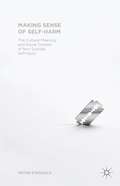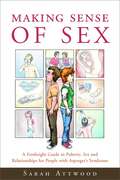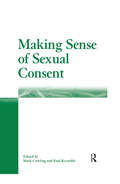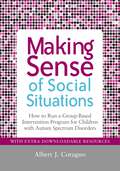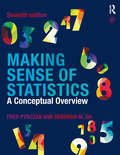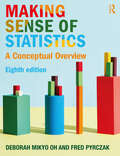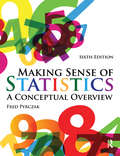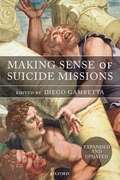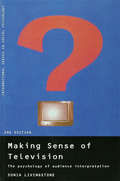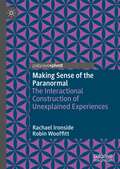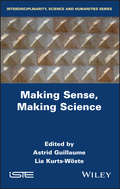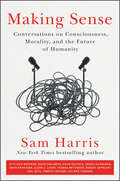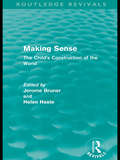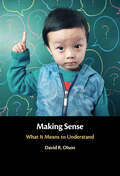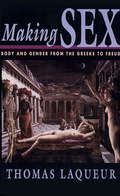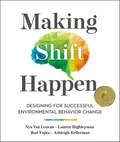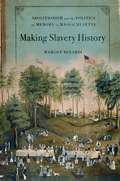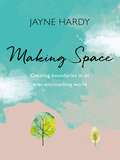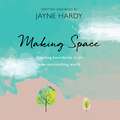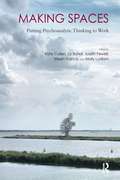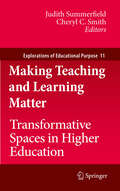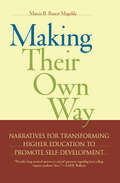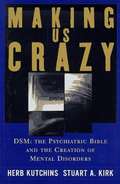- Table View
- List View
Making Sense of Self-harm: The Cultural Meaning And Social Context Of Non-suicidal Self-injury
by Peter SteggalsMaking Sense of Self-Harm provides an alternative approach to understanding nonsuicidal self-injury; using Cultural Sociology to analyse it more as a practice than an illness and exploring it as a powerful cultural idiom of personal distress and social estrangement that is peculiarly resonant with the symbolic life of late-modern society.
Making Sense of Sex: A Forthright Guide to Puberty, Sex and Relationships for People with Asperger's Syndrome
by Sarah AttwoodPuberty is a time of huge change in the physical body, in emotional experience and in social relationships. Having an understanding of these developments and learning how to deal with them is essential, and for people with Asperger's syndrome it can be a challenge to get to grips with the social and emotional aspects of puberty, sex and relationships. This book is ideal for those who need clear, detailed explanations and direct answers to the many questions raised by puberty and sexual maturity. Sarah Attwood describes developments in both the male and female body, and explains how to maintain hygiene and personal care, and to promote general good health. She examines emotional changes, including moods and sexual feelings, and provides comprehensive information on sex, sexual health and reproduction. She looks at the nature of friendship, how it changes from childhood to adulthood and its importance as a basis for sexual encounter. She also offers coping strategies for different social experiences, from bullying to dating, and includes essential tips on the politics of mature behaviour, such as knowing the difference between public and personal topics of conversation. Making Sense of Sex is a thorough guide written in unambiguous language with helpful diagrams, explanations and practical advice for young people approaching puberty and beyond.
Making Sense of Sexual Consent
by Paul Reynolds Mark CowlingThe issue of sexual consent has stimulated much debate in the last decade. The contributors to this illuminating volume make sense of sexual consent from various conceptual standpoints: socio-legal, post-structural, philosophical and feminist. The volume comprises a range of studies, all based around consent within a specific context such as criminal justice, homosexuality, sadomasochism, prostitution, male rape, learning disabilities, sexual ethics, and the age of consent. It is the first collection to publish exclusively on issues of sexual consent, and both makes sense of sexual consent in contemporary society and guides debate towards better consent standards and decisions in the future. Making Sense of Sexual Consent will excite considerable discussion amongst academics, professionals and all those who think that freedom to make decisions about our sexual selves is important. It will set the agenda for debate on sexual consent into the 21st Century.
Making Sense of Social Situations
by Albert J. CotugnoChildren with Autism Spectrum Disorders (ASD) often demonstrate significant deficiencies in social interaction and social communication skills, so it is critical to understand and develop interventions which directly address these needs. This book explores the core areas of ASD development and related deficits, and introduces a practical program to assess and remediate these social competency issues. This book addresses the primary issues of social development in children with ASD by emphasizing the underlying theoretical and pragmatic considerations. Dr. Cotugno employs concepts and theories of group therapy and cognitive-development and integrates them with skill-based instructional approaches to develop the comprehensive Social Competence Enhancement Program (SCEP). This peer-based, group-focused program is explained in detail, including a step-by-step guide to its implementation and a full range of tasks and activities that can be used by practitioners at each stage of the process. This book will be a valuable resource for teachers, clinicians and all other professionals working with children with ASD who are interested in using group interventions as a means to improve social competency and treat social skills deficits.
Making Sense of Statistics: A Conceptual Overview
by Fred Pyrczak Deborah M. OhMaking Sense of Statistics is the ideal introduction to the concepts of descriptive and inferential statistics for students undertaking their first research project. It presents each statistical concept in a series of short steps, then uses worked examples and exercises to enable students to apply their own learning. It focuses on presenting the why as well as the how of statistical concepts, rather than computations and formulae, so is suitable for students from all disciplines regardless of mathematical background. Only statistical techniques that are almost universally included in introductory statistics courses, and widely reported in journals, have been included. Once students understand and feel comfortable with the statistics that meet these criteria, they should find it easy to master additional statistical concepts. New to the Seventh Edition Retaining the key features and organization that have made this book an indispensable text for teaching and learning the basic concepts of statistical analysis, this new edition features: discussion of the use of observation in quantitative and qualitative research the inclusion of introductions to the book, and each Part. section objectives listed at the beginning of each section to guide the reader. new material on key topics such as z-scores, probability, Central Limit Theorem, Standard Deviation and simple and multiple regression Expanded discussion on t test with separate sections for independent and dependent samples t tests, as well as one-sample t test progressive analysis of bivariate vs multivariate statistics (starts with the basic concepts and moves to more complex analysis as the student progresses) updated and extended pedagogical material such as Chapter Objectives, exercises and worked examples to test and enhance student’s understanding of the material presented in the chapter Bolded key terms, with definitions and Glossary for quick referral expanded Appendices include a brief reference list of some common computational formulas and examples. a Glossary of key terms has been added at the end of the book, with references to sections in parenthesis. New online instructor resources for classroom use consisting of test bank questions and Powerpoint slides, plus material on basic math review
Making Sense of Statistics: A Conceptual Overview
by Fred Pyrczak Deborah M. OhMaking Sense of Statistics, Eighth Edition, is the ideal introduction to the concepts of descriptive and inferential statistics for students undertaking their first research project. It presents each statistical concept in a series of short steps, then uses worked examples and exercises to enable students to apply their own learning. It focuses on presenting the “why,” as well as the “how” of statistical concepts, rather than computations and formulas. As such, it is suitable for students from all disciplines regardless of mathematical background. Only statistical techniques that are almost universally included in introductory statistics courses, and widely reported in journals, have been included. This conceptual book is useful for all study levels, from undergraduate to doctoral level across disciplines. Once students understand and feel comfortable with the statistics presented in this book, they should find it easy to master additional statistical concepts. New to the Eighth Edition Reorganization of chapters to allow better progress in conceptual understanding Additional discussions on program evaluation, displays of outcomes, and examples Chapter objectives at the beginning of each chapter are listed with clear learning objectives for the reader Expanded appendices include a reference to common computational formulas and examples A glossary of key terms has been updated to function as a useful vocabulary list for use in a first course in statistics Updated online resources, including a basic math review and answers, PowerPoint slides, and a test bank of questions
Making Sense of Statistics: A Conceptual Overview
by Fred Pyrczak• An overview of descriptive and inferential statistics without formulas and computations. • Clear and to-the-point narrative makes this short book perfect for all courses in which statistics are discussed. • Helps statistics students who are struggling with the concepts. Shows them the meanings of the statistics they are computing. • This book is easy to digest because it is divided into short sections with review questions at the end of each section. • Running sidebars draw students’ attention to important concepts.
Making Sense of Suicide Missions
by Diego GambettaBased on a wealth of original information and research, and containing contributions from internationally distinguished scholars, 'Making Sense of Suicide Missions' furthers our understanding of this chilling feature of the contemporary world in radically new and unexpected ways.
Making Sense of Television: The Psychology of Audience Interpretation (International Series in Social Psychology)
by Sonia LivingstoneTaking the soap opera as a case study, this book explores the 'parasocial interaction' people engage in with television programmes. It looks at the nature of the 'active viewer' and the role of the text in social psychology. It also investigates the existing theoretical models offered by social psychology and other discourses.This second edition takes into account recent research work and theoretical developments in fields such as narrative psychology, social representation theory and ethnographic work on audiences, and look forward to the developing role of audience research. It will be an essential study for students and lecturers in social psychology and media studies.
Making Sense of the Paranormal: The Interactional Construction of Unexplained Experiences
by Robin Wooffitt Rachael IronsideThis book is a study of how people collaboratively interpret events or experiences as having paranormal features, or as evidence of spiritual agency. The authors study recordings of paranormal research groups as they conduct real life investigations into allegedly haunted spaces and the analyses describe how, through their talk and embodied actions, participants collaboratively negotiate the paranormal status of the events they experience.By drawing on the study of the social organisation in everyday interaction, they show how paranormal interpretations may be proposed, contested and negotiated through conversational and embodied practices of the group. The book contributes to the sociology of anomalous experience, and explores its relevance to other social science topics such as dark tourism, participation in religious spaces and practices, and the attribution of agency. This book will therefore be of interest to academics and postgraduate researchers of language and social interaction; discourse and communication, cultural studies; social psychology, sociology of religious experience; parapsychology, communication and psychotherapy.
Making Sense, Making Science
by Astrid Guillaume Lia Kurts-WösteThis book demonstrates the federative power of the methodology of the sciences of culture by exploiting its critical, historical, and comparative principles to address both cultural objects and disciplines that report on them. Scientific activity is rethought in its dimension of interpretative act responsible for both the human and the non-human. This book fills a gap by reconnecting in an innovative and original way the scientific, artistic and ethico-political spheres.
Making Sense: Conversations on Consciousness, Morality, and the Future of Humanity
by Sam HarrisFrom the bestselling author of Waking Up and The End of Faith, an adaptation of his wildly popular, often controversial podcast“Civilization rests on a series of successful conversations.” —Sam Harris Sam Harris—neuroscientist, philosopher, and bestselling author—has been exploring some of the most important questions about the human mind, society, and current events on his podcast, Making Sense. With over one million downloads per episode, these discussions have clearly hit a nerve, frequently walking a tightrope where either host or guest—and sometimes both—lose their footing, but always in search of a greater understanding of the world in which we live. For Harris, honest conversation, no matter how difficult or controversial, represents the only path to moral and intellectual progress. This book includes a dozen of the best conversations from Making Sense, including talks with Daniel Kahneman, Timothy Snyder, Nick Bostrom, and Glen Loury, on topics that range from the nature of consciousness and free will, to politics and extremism, to living ethically. Together they shine a light on what it means to “make sense” in the modern world.
Making Sense: The Child's Construction of the World (Routledge Revivals)
by Jerome BrunerThe growing child comes to understand the world, makes sense of experience and becomes a competent social individual. First published in 1987, Making Sense reflected the way in which developmental psychologists had begun to look at these processes in increasingly naturalistic, social situations. Rather than seeing the child as working in isolation, the authors of this collection take the view that 'making sense' involves social interaction and problem-solving. They particularly emphasize the role of language; its study both reveals the child's grasp of the frames of meaning in a particular culture, and demonstrates the subtleties of concept development and role-taking.
Making Sense: What It Means to Understand
by David R. OlsonUnderstanding, as Descartes, Locke and Kant all insisted, is the primary 'faculty' of the mind; yet our modern sciences have been slow to advance a clear and testable account of what it means to understand, of children's acquisition of this concept and, in particular, how children come to ascribe understanding to themselves and others. By drawing together developmental and philosophical theories, this book provides a systematic account of children's concept of understanding and places understanding at the heart of children's 'theory of mind'. Children's subjective awareness of their own minds, of what they think, depends on learning a language for ascribing mental states to themselves and others. This book will appeal to researchers in developmental psychology, cognitive science, education and philosophy who are interested in the cognitive and emotional development of children and in the more basic question of what it means to have a mind.
Making Sex: Body and Gender from the Greeks to Freud
by Thomas LaqueurThis is a book about the making and unmaking of sex over the centuries. It tells the astonishing story of sex in the West from the ancients to the moderns in a precise account of developments in reproductive anatomy and physiology. We cannot fail to recognize the players in Thomas Laqueur’s story—the human sexual organs and pleasures, food, blood, semen, egg, sperm—but we will be amazed at the plots into which they have been woven by scientists, political activists, literary figures, and theorists of every stripe. <P><P> Laqueur begins with the question of why, in the late eighteenth century, woman’s orgasm came to be regarded as irrelevant to conception, and he then proceeds to retrace the dramatic changes in Western views of sexual characteristics over two millennia. Along the way, two “masterplots” emerge. In the one-sex story, woman is an imperfect version of man, and her anatomy and physiology are construed accordingly: the vagina is seen as an interior penis, the womb as a scrotum, the ovaries as testicles. The body is thus a representation, not the foundation, of social gender. The second plot tends to dominate post-Enlightenment thinking while the one-sex model is firmly rooted in classical learning. The two-sex story says that the body determines gender differences, that woman is the opposite of man with incommensurably different organs, functions, and feelings. The two plots overlap; neither ever holds a monopoly. Science may establish many new facts, but even so, Laqueur argues, science was only providing a new way of speaking, a rhetoric and not a key to female liberation or to social progress. Making Sex ends with Freud, who denied the neurological evidence to insist that, as a girl becomes a woman, the locus of her sexual pleasure shifts from the clitoris to the vagina; she becomes what culture demands despite, not because of, the body. Turning Freud’s famous dictum around, Laqueur posits that destiny is anatomy. Sex, in other words, is an artifice. <P><P> This is a powerful story, written with verve and a keen sense of telling detail (be it technically rigorous or scabrously fanciful). Making Sex will stimulate thought, whether argument or surprised agreement, in a wide range of readers.
Making Shift Happen: Designing for Successful Environmental Behavior Change
by Nya Van Leuvan Lauren Highleyman Rod Fujita Ashleigh KellermanNautilus Book Award Winner: An “engagingly written” behavioral science-based guide to tackling our urgent environmental problems (Robert B. Cialdini, author of Influence: The Psychology of Persuasion).To create a sustainable future and achieve positive, durable change, we must design solutions based directly on how people think, make decisions, and act. From hotels that save water (and money) using simple signage to energy suppliers that boost participation in renewable energy programs through mere enrollment-form tweaks, it’s clear that shifting the behavior of millions for the better is possible.Based on decades of research into what drives behavior change, Making Shift Happen provides a suite of powerful tools to transform the world. It features A-to-Z guidance on how to design a behavior change initiative—from choosing the right audience and uncovering what drives their behavior to designing, prototyping, testing, and implementation. Clear instructions and real-world examples empower you to apply hundreds of behavioral science solutions including:Using social norms to spread positive environmental behaviorsSelecting and testing stories, metaphors, and values to frame information for each audienceCatalyzing action by aligning your initiative with your audience’s personal and social motivatorsBreaking bad habits and building positive onesCapturing your audience’s attention and reducing barriers to actionConnecting people with nature and building empathy for the environment and its inhabitantsMaking Shift Happen is a must-have guide for practitioners in non-profits, governments, and businesses looking to design successful campaigns and initiatives that shift behaviors and mindsets toward positive environmental outcomes and a better future for all.“Completely fascinating—we’ve learned a lot about the ways minds work in the last decades and that may help us figure out how to appeal to our better angels more effectively than in the past. Rest assured that people who want to sell us junk are paying attention to these insights—the rest of us better do so too!” —Bill McKibben, author of The End of Nature
Making Slavery History: Abolitionism and the Politics of Memory in Massachusetts
by Margot MinardiMaking Slavery History focuses on how commemorative practices and historical arguments about the American Revolution set the course for antislavery politics in the nineteenth century. The particular setting is a time and place in which people were hyperconscious of their roles as historical actors and narrators: Massachusetts in the period between the Revolution and the Civil War. This book shows how local abolitionists, both black and white, drew on their state's Revolutionary heritage to mobilize public opposition to Southern slavery. When it came to securing the citizenship of free people of color within the Commonwealth, though, black and white abolitionists diverged in terms of how they idealized black historical agency. Although it is often claimed that slavery in New England is a history long concealed, Making Slavery History finds it hidden in plain sight. <p><p>From memories of Phillis Wheatley and Crispus Attucks to representations of black men at the Battle of Bunker Hill, evidence of the local history of slavery cropped up repeatedly in early national Massachusetts. In fixing attention on these seemingly marginal presences, this book demonstrates that slavery was unavoidably entangled in the commemorative culture of the early republic-even in a place that touted itself as the "cradle of liberty." Transcending the particular contexts of Massachusetts and the early American republic, this book is centrally concerned with the relationship between two ways of making history, through social and political transformation on the one hand and through commemoration, narration, and representation on the other. Making Slavery History examines the relationships between memory and social change, between histories of slavery and dreams of freedom, and between the stories we tell ourselves about who we have been and the possibilities we perceive for who we might become.
Making Space: Creating boundaries in an ever-encroaching world
by Jayne HardyBoundaries and self-care go hand in hand; you can't have one without the other. We understand the importance of self-care, but how do we protect the space within which we do it?When we have healthy boundaries, we create a space between us and all else, where we feel safe, clear and confident in who we are and what we want and need. Our boundaries - the limits we place on what we will and won't tolerate - define our routines, habits, choices, parenting, jobs, relationships; everything. And there's nothing more important for our self-care.In this practical guide, Jayne Hardy - author of The Self-Care Project and founder and CEO of The Blurt Foundation - helps us explore our existing boundaries; the ones that work for us and the ones that work against us; and guides us on creating new boundaries so that our physical, mental, emotional and digital spaces are protected. Packed with friendly advice, the latest research and worksheets to help you reflect on your own experiences, Making Space is for anyone who feels overwhelmed, disconnected or walked on by life, and wants to make a change in an ever-encroaching world.
Making Space: Creating boundaries in an ever-encroaching world
by Jayne HardyBoundaries and self-care go hand in hand; you can't have one without the other. We understand the importance of self-care, but how do we protect the space within which we do it?When we have healthy boundaries, we create a space between us and all else, where we feel safe, clear and confident in who we are and what we want and need. Our boundaries - the limits we place on what we will and won't tolerate - define our routines, habits, choices, parenting, jobs, relationships; everything. And there's nothing more important for our self-care.In this practical guide, Jayne Hardy - author of The Self-Care Project and founder and CEO of The Blurt Foundation - helps us explore our existing boundaries; the ones that work for us and the ones that work against us; and guides us on creating new boundaries so that our physical, mental, emotional and digital spaces are protected. Packed with friendly advice, the latest research and worksheets to help you reflect on your own experiences, Making Space is for anyone who feels overwhelmed, disconnected or walked on by life, and wants to make a change in an ever-encroaching world.
Making Space: Creating boundaries in an ever-encroaching world
by Jayne HardyBoundaries and self-care go hand in hand; you can't have one without the other. We understand the importance of self-care, but how do we protect the space within which we do it?When we have healthy boundaries, we create a space between us and all else, where we feel safe, clear and confident in who we are and what we want and need. Our boundaries - the limits we place on what we will and won't tolerate - define our routines, habits, choices, parenting, jobs, relationships; everything. And there's nothing more important for our self-care.In this practical guide, Jayne Hardy - author of The Self-Care Project and founder and CEO of The Blurt Foundation - helps us explore our existing boundaries; the ones that work for us and the ones that work against us; and guides us on creating new boundaries so that our physical, mental, emotional and digital spaces are protected. Packed with friendly advice, the latest research and worksheets to help you reflect on your own experiences, Making Space is for anyone who feels overwhelmed, disconnected or walked on by life, and wants to make a change in an ever-encroaching world.
Making Space: How the Brain Knows Where Things Are
by Jennifer M. GrohKnowing where things are seems effortless. Yet our brains devote tremendous power to figuring out simple details about spatial relationships. Jennifer Groh traces this mental detective work to show how the brain creates our sense of location, and makes the case that the brain's systems for thinking about space may be the systems of thought itself.
Making Spaces: Putting Psychoanalytic Thinking to Work
by Liz Bondi Judith Fewell Kate Cullen Eileen Francis Molly LudlamThis book argues for the value and application of psychoanalytic thinking beyond, as well as within, the consulting room. Inspired by a Scottish psychoanalytic tradition that owes much to W.R.D. Fairbairn and J.D. Sutherland, the Scottish Institute of Human Relations has provided a valuable reference point for the work described in the book. It illustrates how the coming together of human beings into a shared space fosters opportunities to create loving, collaborative relationships in which to work and from which to grow. The book's first section explores how psychoanalytic thinking developed in Scotland, while section two focuses on work with children, families and couples, showing how psychoanalytic perspectives can be used to strengthen capacities for loving relationships. The chapters in section three show how psychoanalysis can be applied in such varied settings as psycho-social research, education, institutional development and organisational consultancy. The fourth section pursues this theme further, considering the potential of psychoanalytic concepts to enhance work in religious ministry, in medical and psychiatric services, and in understanding the processes of ageing.
Making Teaching and Learning Matter
by Judith Summerfield Cheryl C. SmithThis volume captures the spirit of collaboration and innovation that its authors bring into the classroom, as well as to groundbreaking undergraduate programs and initiatives. Coming from diverse points of view and twenty different disciplines, the contributors illuminate the often perplexing debates about what matters most in higher education today. Each chapter tells a unique story about creating vital pedagogical arenas that have the potential to transform teaching and learning for both faculty and students. These exploratory spaces include courses under construction, cross-college and interdisciplinary collaborations, general education reform initiatives, and fresh perspectives on student support services, faculty development, freshman learning communities, writing across the curriculum, on-line degree initiatives, and teaching and learning centers. All these spaces lend shape to an over-arching, system-wide project bringing together the often disconnected silos of undergraduate education at The City University of New York (CUNY), America's largest urban public university system. Since 2003, the University's Office of Undergraduate Education has sponsored coordinated efforts to study and improve teaching and learning for the system's 260,000 undergraduates enrolled at 18 distinct colleges. The contributors to this volume present a broad spectrum of administrative and faculty perspectives that have informed the process of transforming the undergraduate experience. Combined, the voices in these chapters create a much-needed exploratory space for the interplay of ideas about how teaching and learning need to matter in evolving notions of higher education in the twenty-first century. In addition, the text has wider social relevance as an in-depth exploration of change and reform in a large public institution.
Making Their Own Way: Narratives for Transforming Higher Education to Promote Self-Development
by Marcia B. MagoldaWINNER OF AERA’S NARRATIVE & RESEARCH SPECIAL INTEREST GROUP 2003 BOOK AWARDWhat impact does a college education have on students' careers and personal lives after they graduate? Do they consider themselves well prepared for the demands and ambiguities of contemporary society? What can we learn from their stories to improve the college learning experience?This groundbreaking book extends Marcia Baxter Magolda’s renowned longitudinal study and follows her participants’ lives from their graduation to their early thirties. We follow these students’ journeys to an internally-authored sense of identity and how they make meaning of their lives. From this, the author proposes a new framework for higher education to better foster students' crucial journeys of transformation--through the shaping of curriculum and co-curriculum, advising, leadership opportunities, campus work settings, collaboration, diversity and community building.This is an important book for all faculty, administrators and student affairs professionals.
Making Us Crazy: The Psychiatric Bible and the Creation of Mental Disorders
by Herb Kutchins Stuart A. KirkThe authors map the complex, quirky history of the DSM, often called the "psychiatric Bible" from its inception in the early 1950s to the present. They show that the DSM has been used and misused to shape social policy toward people with mental illnesses. The DSM has also been highly subject to political currents. Specific "diagnoses" such as homosexuality, borderline personality, and post-traumatic stress disorder are discussed in depth as illustrations.
